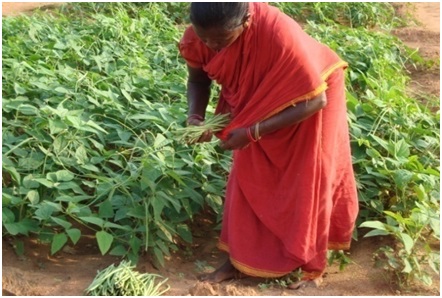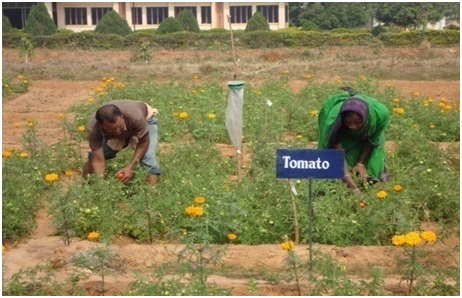Technologies for Women in Agriculture => Crop Production & Horticulture
ORGANIC FARMING TECHNOLOGY FOR VEGETABLES
Back ground
Intensive crop production system significantly enhanced the use of high energy inputs as well as greater exploitation of irrigation potentials which indiscriminately affects production and productivity of various crops as well as deterioration of soil health and environments. The sustainability in crop productivity, soil health maintenance and ecosystem conservation are the need of the hour which can be thought of with the adoption of organic farming as it offers the sustainable farming systems with recurring benefits as well as stability in the production. Vegetable crops have been well advocated in solving the problem of livelihood security of women due to their market potential. In India the potential of vegetables is further enhanced with the increase awareness about consumption of chemical- free vegetables. Moreover, suitability of vegetables to grow organically, high market price open new avenue for income generation of women.
Technology description
Cow pea (Utkal Manika), tomato (B.T.- 10), okra (Utkal Gaurav) and pumpkin (Baidyabeti) vegetables were grown with the application of three organic sources viz., farmyard manure @ 20t/ha, neem cake @ 2t/h vermi-compost @ 6t/ha. Farmyard was incorporated 15- 20 days before at the time of land preparation while neem cake and vermi-compost were applied in the soil 10 days prior to the sowing/ transplanting. The insects and diseases were managed through organically pesticides. Crop rotation was also followed for maintain of soil fertility and control of insect pest and diseases.
How it is women friendly?
- Since women's participation in vegetable production is very high and they are growing vegetables in homestead with low inputs for their family consumption.
- Women are not able to invest more money for procurement of chemical fertilizers and insecticides and moreover these inputs are not easily accessible for them.
- Besides these, they are not much aware about the proper application of chemicals as they are exposed to various kinds of health hazards.
- They are not getting quality and nutritious rich food as they are suffering from malnutrition.
- Research shows that on an average, organic food contain higher level of vitamin C, good taste and essential minerals as well as cancer fighting antioxidants.
Performance:
- This technology is suitable for small and marginal farmers for growing vegetables in their homestead for self consumption and also for progressive farmers for commercial scale to meet out the domestic demand.
Locale of dissemination/ application:
The small and marginal farmers and also progressive farmers may adopt this organic farming technology for self consumption and for income generation purpose.
Outcomes/impact/benefits:
- More benefit can be earned if adopted this technology.
Limitations if any
- Nil
Photos
 |
 |
Source (author/organization):
Naresh Babu, S.K. Srivastava & M.P.S.Arya, ICAR - Central Institute for Women in Agricultur, Bhubaneswar, Odisha
Developed/tested/refined:
Tested and modified for cropping system based on agro-climatic condition.
Year and purpose:
2009-2012 to provide organically produce.
Cost:
Rs10- 15 /kg produce
Patent/Commercialization:
Nil
Weather further study/ modification are required or not:
Nil

